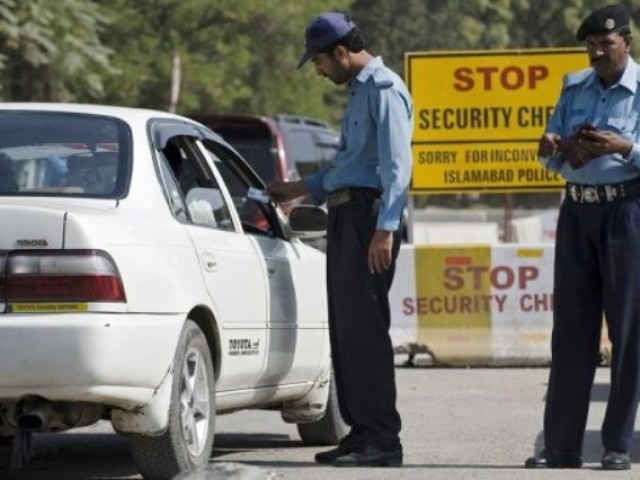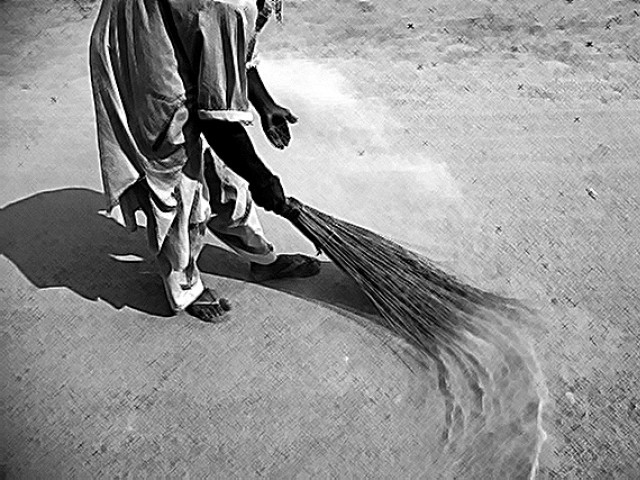Express Tribune Published: September 22, 2013


My husband and I had the dubious fortune of visiting a government office recently. Before we entered we were stopped at a security barrier as usual. My husband has a martial air about him, it seems, because they often mistake him for an army officer. In Lahore, that’s useful. Not one to be left behind, I too can produce my alter ego when required, you know, as though there’s something smelly under my nose, like Mrs Malfoy, and that’s useful too.
The security guard took one look at us two stiff necks in the back seat and his resolution wavered, as did the instrument in his hand, the danda (pole) with the mirror at the end with which they check the underside of a car. He poked defiantly at the wheel, but without wasting our time further, let us through to our appointment with the big stink at the other end.
We don’t normally terrorise the local populace this way but we just wanted to see how well this security works. As we found out, so much for security at this barrier.
Certain persons in their wisdom from their air conditioned offices have installed security barriers at the entrance to cantonments, hotels, government offices, malls and so forth. These barriers hinder the public as it moves about its business but clearly fail to hinder terrorists as they move about theirs. Zamurrad Khan comes strongly to mind. What is going wrong?
Security is effective only if the checking is thorough and impartial. But naturally if each person is checked very thoroughly as he/she goes about his daily business life would grind to a halt. Therefore people are checked carelessly, or not at all.
Secondly, as mentioned above, those with presumed clout (such as army officers and Convent school alumni) get waved through, because the guards are worried about repercussions if they fail to oblige. This is not an unfounded fear; they are punished for doing their job. Unfortunately, terrorists can dissemble as well as the next guy, and they never fail to oblige either.
Thirdly, women generally get through without any checks at all.
I fail to understand the attitude towards women in Pakistan. Either, they get acid thrown onto their faces, and their heads blown away, or they are treated as the ‘mothers and sisters of the nation’ – pushed to the front of every queue and allowed unchecked through security barriers.
Well, I have no wish to be either mother or sister to some of the characters around, and I take exception to the presumption that I, as a woman, am incapable of transporting/detonating a bomb. I am not an idiot, ET’s profile photograph not withstanding.
I can pull pins out of my hair, so I am perfectly capable of pulling pins out of a grenade. Let me tell you: in class seven at CJM, it was I who ground that stink bomb under the heel of my foot in Ms Amy King’s English class. Nobody knew this except my confederates, and now you do, but I still hope Ms King doesn’t read the ET. And you know the time Ms D’Souza (alias Choozi, the teacher who taught art to all of Lahore), was walking down the driveway into Cathedral school, and she did a double take and tripped over her umbrella? Well, it was because I chucked a tiny yellow toy (it was soft, very soft) chicken at her back from the safety of our car.
With that record, I’m a likely candidate for bombing the Parliament house, or throwing my spiky hair curlers at the Prime Minister as he rolls by in his armoured car and cavalcade of seventy. Guy Fawkes probably started just as small, setting little phantom fires at the local boy scout jamboree. So, never underestimate the power of women. Witness mothers-in-law everywhere, and I am one too! Bwahaha!
Most people have no wish to harm anyone, and I doubt if most of those poor sods who blow themselves up, do either. How can we understand what compulsions force them to do what they do? Little do we know about how children are kidnapped or even otherwise steeped in demonic doctrines; how the lure of financial security for their families is dangled before poverty stricken individuals, in exchange for and skilfully interwoven with visions of security in paradise. Perhaps these thoughts are also present in the minds of the guys at the naqas, who last week checked only the boot of my car, and let me through, when clearly visible on the seat beside me was a large, a very large ice box that could have contained half a grandmother, one bomb a-ticking, and five Kalashnikovs.
Lucky for everyone (and the grandmother), that it didn’t.

